Salary advance letter template
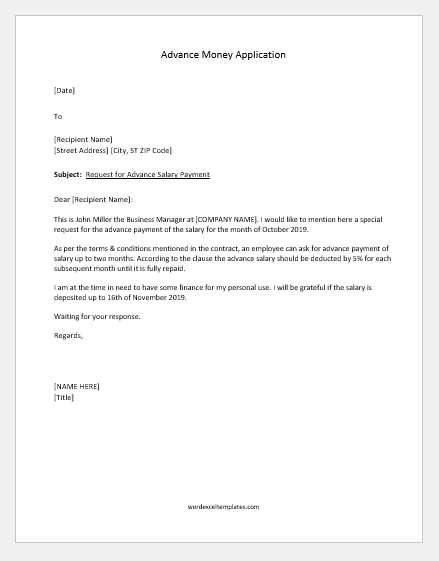
Requesting an advance on your salary can be a sensitive matter. A well-crafted salary advance letter ensures professionalism and clarity in your communication with your employer. This template helps you articulate your request in a concise and respectful manner, while also increasing your chances of a positive response.
Be clear and direct about the reason you need the salary advance. Outline the amount requested and the repayment terms, if applicable. Keeping your tone polite and understanding of your employer’s position will demonstrate your responsibility and reliability.
In your letter, include necessary details such as your current salary, the date of the expected payment, and how quickly you can repay the advance. You may also want to offer flexibility in case your employer has specific conditions for granting the request. A well-structured letter helps avoid misunderstandings and maintains a good relationship with your employer.
Here’s the corrected text:
When writing a salary advance letter, keep it clear and respectful. Begin by addressing the recipient properly and stating your request right away. For example, specify the amount of the advance and the reason, if relevant. Include the intended repayment schedule to show that you understand your obligations.
Key Points to Include:
Subject Line: Make sure the subject line is straightforward, such as “Salary Advance Request” or “Request for Salary Advance”. This will ensure your request is easily understood from the start.
Clear Request: State the specific amount you are requesting and explain how it will be repaid. If the company has policies about repayment schedules, mention them. If you’re uncertain, propose a reasonable plan, such as weekly or monthly deductions from your salary.
Reason for Request: While not always necessary, briefly stating the reason for the request can provide clarity. However, it’s not required if the reason is personal or sensitive.
Closing and Signature:
End the letter by thanking the recipient for considering your request. Use a polite closing like “Sincerely” or “Best regards”, and then sign your name. This maintains professionalism and shows your appreciation for their time.
- Salary Advance Letter Template
To request a salary advance, you can follow this simple template. A salary advance letter should be clear and professional, highlighting the amount requested and the reason for the advance. Below is a straightforward format to guide you:
Salary Advance Request Letter Template
Dear [Manager’s Name],
I hope this message finds you well. I am writing to formally request a salary advance for [amount requested]. The reason for this request is [briefly explain the reason, e.g., unexpected medical expenses, urgent family matters, etc.].
As per company policy, I understand that salary advances are granted under specific circumstances. I assure you that I will be able to repay the advance through deductions from my future paychecks. I propose to repay the amount over [specify number of pay periods or terms].
I would appreciate it if you could consider my request and let me know the next steps. Thank you for your time and understanding. I look forward to your response.
Best regards,
[Your Name]
[Your Job Title]
[Your Contact Information]
Points to Remember
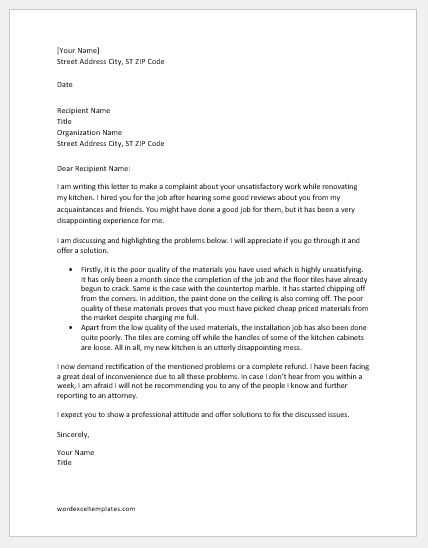
- Keep your letter brief and direct.
- State the exact amount you’re requesting.
- Offer a reasonable repayment plan.
- Explain the reason for the request concisely.
- Use a formal tone throughout the letter.
This template can be adjusted based on your company’s specific policies and any personal details you may need to include. Adjustments in the repayment terms or amounts can be made based on your employer’s preference and your agreement. Be sure to follow up if needed and keep the communication professional.
Clearly state your need for an advance in the first paragraph. Specify the amount you’re requesting and provide a reason, such as an emergency or urgent financial need. This shows transparency and builds trust with your employer.
Next, outline your current salary and any outstanding amounts that can be deducted from your paycheck. This helps demonstrate your ability to repay the advance.
In the following paragraph, indicate your preferred repayment terms. Whether you want the amount deducted from one or several paychecks, mention this detail. Be open to discussing flexible options if the employer has concerns.
Finally, express your gratitude. Acknowledge the consideration and assistance your employer can offer. This shows professionalism and respect for their position.
| Key Details | Recommendation |
|---|---|
| Amount Requested | Be specific about the exact sum |
| Reason for Request | Clearly explain the reason for needing the advance |
| Repayment Plan | State how and when you plan to repay the advance |
| Gratitude | End the letter by thanking the employer for their consideration |
Key Information to Include in Your Request Letter
Clearly state the amount of salary advance you are requesting. Be specific about the sum, and explain the reason for the request in straightforward terms. Mention any urgent personal or financial needs without oversharing private details.
Provide Your Repayment Plan
Outline how you plan to repay the advance. Include a proposed timeline and any arrangements for deductions from your future salary. This demonstrates your commitment to honoring the agreement and reassures your employer about your responsibility.
Include Your Contact Information
Make it easy for your employer to reach you by providing your phone number or email address. This ensures they can discuss any details related to your request without delays.
Finally, express gratitude for their consideration. This small gesture reinforces a positive and professional tone in your letter.
When requesting a salary advance, it’s easy to overlook details that could impact the decision. Here are some key mistakes to avoid:
- Being vague about the amount needed: Always specify the exact amount you require. General requests like “I need some money” can confuse or delay the process. Clearly stating the amount ensures transparency and makes your request easier to process.
- Not explaining the reason for the request: Employers will be more willing to approve an advance if they understand why you need it. Be honest and clear about your situation, whether it’s an unexpected expense or an emergency.
- Failing to mention repayment terms: Don’t assume the employer will decide how repayment works. Outline your plan to repay the advance, including timing and method of repayment. This shows responsibility and helps set clear expectations.
- Not checking company policies: Some companies have strict guidelines on salary advances. Research or ask HR about the rules before making a request. Failing to follow company procedures can lead to misunderstandings or denials.
- Not being considerate of the timing: Timing matters when asking for an advance. Avoid making requests during stressful periods for the company, like during busy seasons or right after financial setbacks.
- Being too pushy: If your request is not approved immediately, avoid pressuring your employer. Respect their decision and follow up in a professional manner if needed. Persistence can backfire if not handled delicately.
- Not offering a repayment schedule: Without a clear repayment schedule, your request might seem too risky. A repayment plan demonstrates you are committed to paying back the advance and allows your employer to assess the feasibility of the request.
Ensure that your request for an advance aligns with the company’s policies. Review your employment contract to understand any clauses about salary advances, as they might dictate the terms under which you can request one. For example, some agreements specify the maximum amount that can be advanced or the required repayment conditions.
Understand that employers are not legally obligated to grant salary advances. While many companies offer this as a benefit, there is no federal law requiring them to do so. Therefore, a salary advance is typically a discretionary decision by the employer.
Clearly define the repayment schedule when requesting an advance. This should be agreed upon by both you and your employer. Typically, repayment might be deducted from future paychecks, and it is essential to ensure these terms are explicitly documented to avoid misunderstandings.
If you work in a jurisdiction with specific labor laws related to wage advances, make sure you are aware of any limitations or requirements. For instance, certain regions may limit how much of a salary can be advanced or impose restrictions on repayment terms.
Lastly, communicate openly with your employer. Being transparent about your financial situation and explaining why you need the advance can help ensure the process goes smoothly, reducing the chances of potential legal issues arising later on.
Start your salary advance request with a polite and clear subject line. Use something like “Salary Advance Request for [Month]” or “Request for Salary Advance – [Your Name]” to ensure the purpose is immediately clear.
Addressing Your Employer
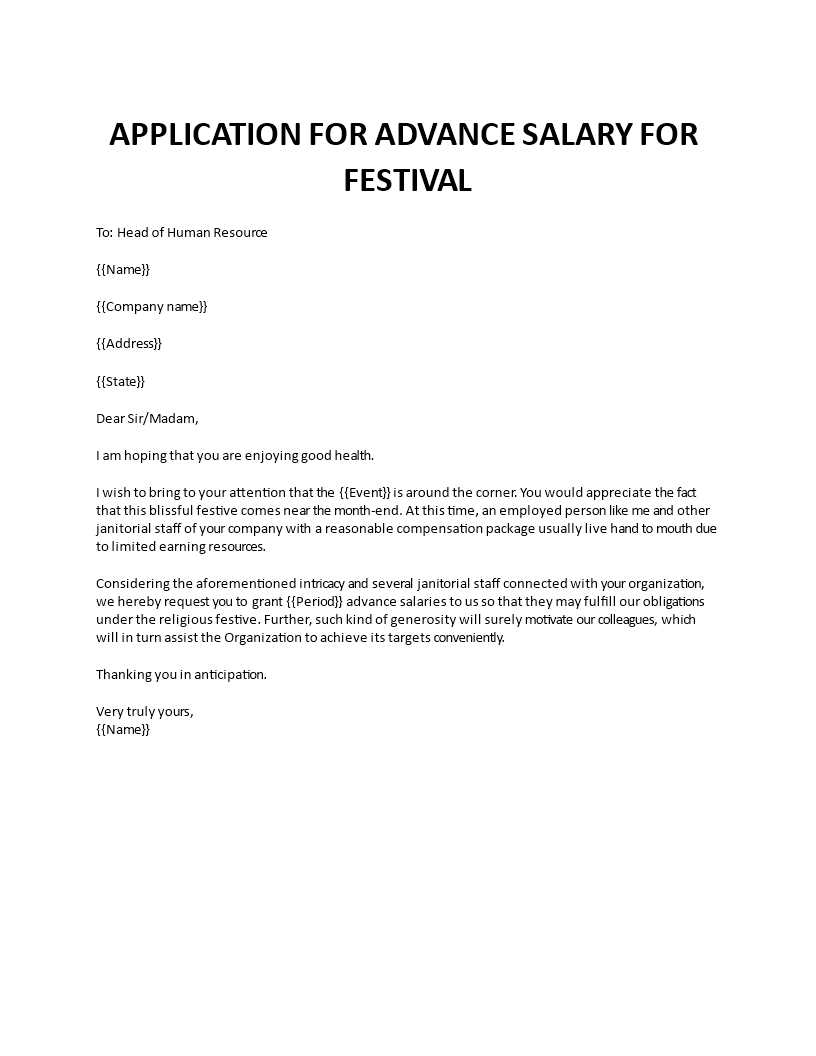
Begin with a formal greeting. Address your supervisor or HR manager directly, such as “Dear [Name],” or “Dear [HR Department],”. This keeps the tone respectful and professional.
Provide the Necessary Details
Explain your request in a clear and concise manner. Mention the amount you wish to receive and specify the reason for the request. If it’s related to unexpected expenses, briefly explain without going into personal details.
| Details | Information |
|---|---|
| Request Amount | Specify the exact amount you are requesting. |
| Reason | State a brief, straightforward reason for the request (e.g., urgent medical expenses, emergency repairs, etc.). |
| Repayment Plan | Offer a repayment plan if applicable, outlining how you plan to repay the advance. |
Conclude your request with a polite closing. A simple “Thank you for considering my request. I look forward to your response.” shows appreciation and professionalism.
Next Steps After Submitting Your Request
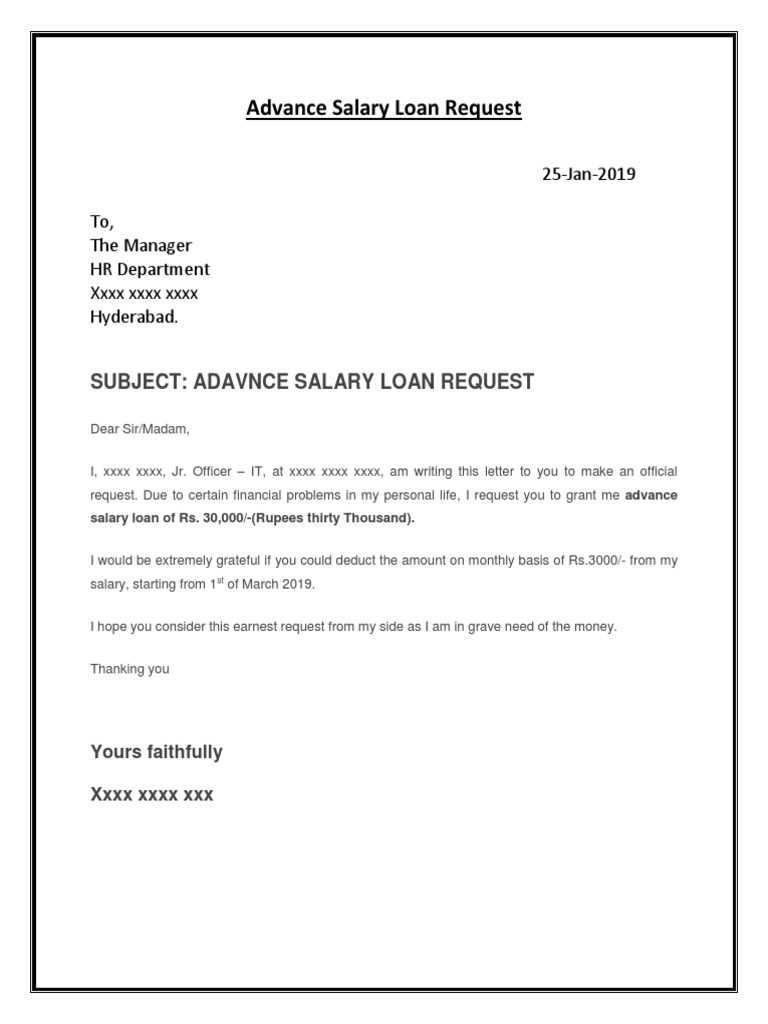
Once you’ve submitted your salary advance request, here’s what you should expect next:
- Wait for Confirmation: You will typically receive an acknowledgment from HR or your manager confirming the receipt of your request. This may happen via email or through the internal system.
- Review Process: Your request will be reviewed, and HR or finance will assess whether the advance is feasible based on company policies and your employment status.
- Clarify Any Questions: Be prepared to provide additional information if requested. This could include clarification on the amount or reasons for the request.
- Approval or Denial: Depending on the review, you’ll receive a response outlining whether your request has been approved or denied. If approved, you will be informed of the terms, including repayment details.
- Receive the Advance: If approved, the salary advance will be processed, and the funds should be transferred to your account, often within a few business days.
- Repayment Arrangement: Ensure you understand the repayment terms and schedule. These may vary based on the agreement you have with your employer.
Keep track of all communication, and stay proactive in addressing any questions or concerns that may arise during this process.
Salary Advance Letter Template
Ensure that the letter is brief and clear, with specific details about the advance request. Begin with a professional greeting, and state the purpose of the letter right away. Specify the amount of money requested, the reason for the request, and any relevant dates. Be sure to mention the repayment terms, such as how the advance will be deducted from future salaries. Always express gratitude for considering the request.
Key Points to Include
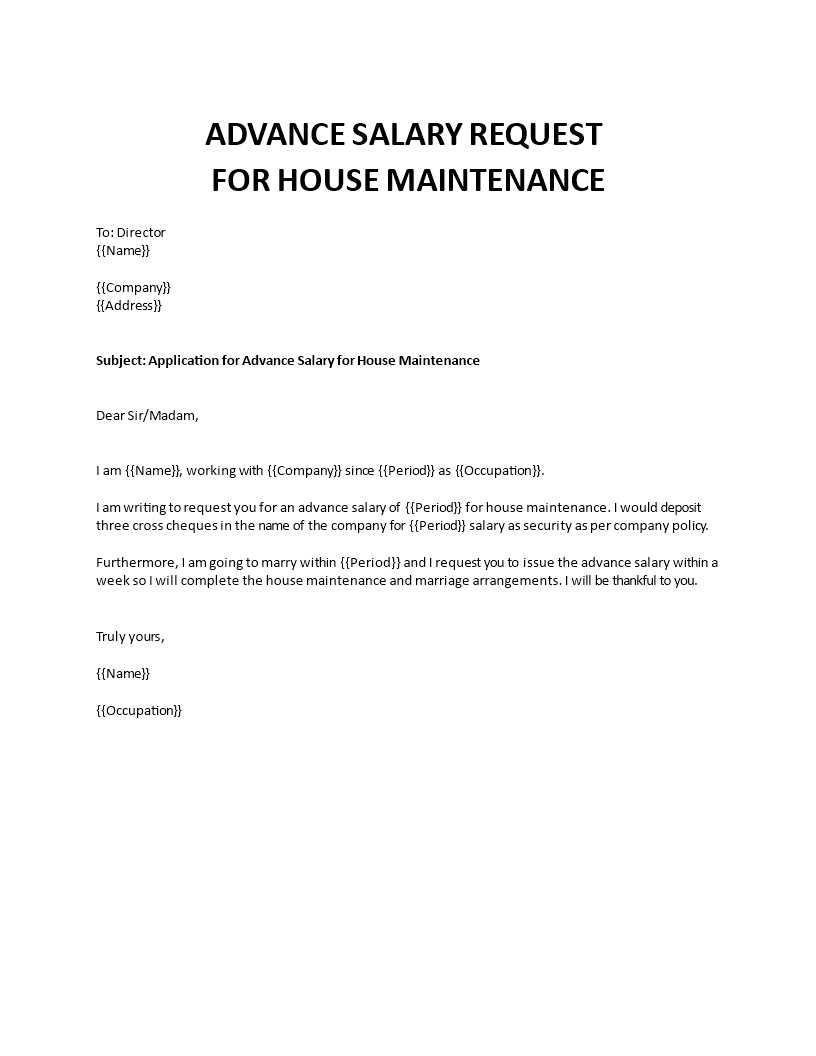
1. Include your full name, position, and department.
2. Clearly mention the amount of the salary advance.
3. State the reason for the request in a concise and professional manner.
4. Outline the repayment plan, whether it will be deducted from future paychecks or repaid in a lump sum.
5. Close with appreciation for the company’s consideration of your request.
Template Example
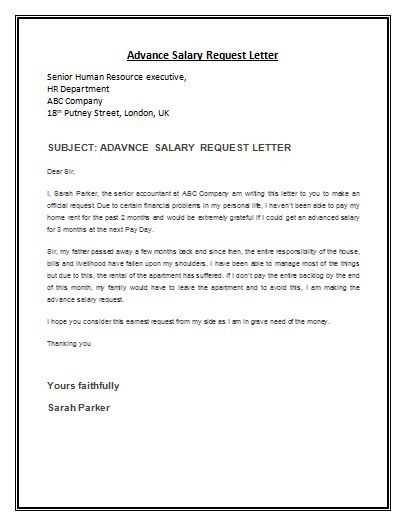
Subject: Request for Salary Advance
Dear [Manager’s Name],
I hope this message finds you well. I am writing to request an advance on my salary for the amount of [requested amount]. The reason for this request is [brief reason]. I propose that the advance be repaid by [repayment method] over [time period].
Thank you for your consideration. Please let me know if you need any further details.
Sincerely,
[Your Name]